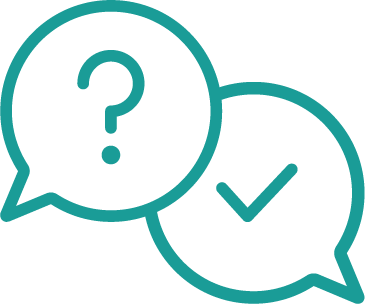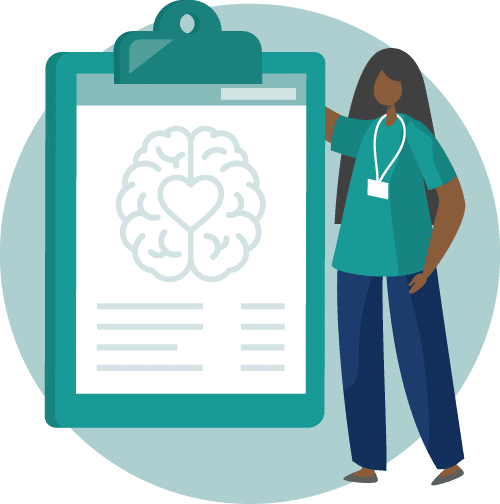Overview
This program provides a comprehensive overview of how mental health technicians treat patients coping with a variety of mental health issues like drug and alcohol addiction, physical abuse, depression, anxiety, etc.
Program Timeline
Learners have 12 months of access to complete their program. 10 hours of dedicated training each week is recommended to complete your training before access expires.
Self-paced learning
![]() 12 months of program access
12 months of program access
Training Format
CareerStep programs are made to accommodate hectic schedules. You can train whenever and wherever works best for you—at home, at lunch, at midnight, you name it. Study at your own pace, and hit us up anytime you need help.
Learn from home (or anywhere)
Train online (anytime)
Support
Need help getting through your training? We’re available! Our Learner and technical support teams are ready to provide advice and answer questions—just give us a ring or drop us a line.
 1:1 support
1:1 support
![]() Phone, live chat, and email
Phone, live chat, and email
Mental Health Technician Training Modules
Our Mental Health Technician program is divided into 14 courses, which cover a number of topics including suicide awareness, developmental influences, and various communication methods.
Program Orientation: Mental Health Technician
- Initiate the Mental Health Technician Training Program
Pharmacology Basics
- Identify the classifications of drugs.
- Review indications, side effects, and adverse reactions of various classifications of drugs.
- Interpret accepted abbreviations used in reference to medications.
- Explain how to use drug reference guides.
- Describe the rights of proper drug administration.
- Describe the routes of administration for medication.
- Explain how to prepare and administer the most common types of medications.
- Identify the four steps of pharmacokinetics.
- Explore the guidelines for sending orders for prescriptions.
- Calculate correct dosage of medication for administration.
- Convert between household and metric systems of measurement.
- Identify commonly used abbreviations in medication dosage calculation.
Infection Control
- Review the causes and diagnostic methods of various infectious and communicable diseases.
- Explore the protective measures required to prevent infection.
- Outline the treatments and protective measures required to manage and control the spread of infectious disease.
- Identify procedures and protocols for responding to infection control.
Testing and Laboratory Procedures
- Identify how specimens are collected and handled.
- Explore procedures and processes used in obtaining blood and urine samples.
- Outline the standard components of vision and hearing screening tests.
- Review common techniques and processes frequently used in medical laboratories.
Patient Care Coordination and Education
- Review how to administer and coordinate general patient care according to professional best practices.
- Explore the role and responsibilities in administering patient care.
- Explore the role and responsibilities in facilitating patient education.
- Summarize basic communication best practices and potential barriers to effective communication with patients.
Medical Administrative Assistant
- Describe the differences between common healthcare delivery models.
- Describe the types of services typically offered in medical offices, including general and specialty services.
- Define ancillary services and alternative therapies.
Communication and Customer Service
- Identify the various types and styles of communication used in a healthcare office.
- Review how verbal, non-verbal, and written communication skills contribute to patient experience and outcome in a healthcare office.
- Identify professional communication techniques for a healthcare office, including interviewing techniques and use of medical terminology and patient-accessible language.
- Explore modified communication for patients with special considerations.
- Outline protocols for providing customer service for a healthcare office.
Electronic Medical Records
- Explain the importance of clinical standards in the development of interoperable electronic health records.
- Demonstrate an understanding of how electronic health records are used in physician practices and other outpatient settings.
- Demonstrate an understanding of how electronic health records are used in hospitals.
Medical Laws and Ethics
- Describe the structure of the healthcare industry and how it relates to the medical office profession.
- Identify law and regulations related to the healthcare workplace.
- Describe how law flows from the constitution to the courtroom.
- Identify criminal acts and intentional torts.
- Recognize what makes a contract and who can contract.
- Identify medical malpractice and other lawsuits.
- Explain the characteristics, ownership, and confidentiality of the health record.
- Recognize the importance of the laws and ethics of patient confidentiality.
- Explain professional ethics and how they apply to patients.
- Recognize ethical issues surrounding the beginning of life.
- Recognize ethical issues surrounding death and dying.
EKG and Cardiovascular
- Identify the basic anatomy of the heart.
- List the steps needed to ensure proper functioning of ECG/EKG equipment (calibration, standardization).
- List the equipment and supplies needed to perform an ECG/EKG procedure.
- Identify the placement of standard limb leads and precordial (chest) leads on a patient undergoing an ECG/EKG procedure.
- Identify waveforms, intervals, and segments in EKG/ECG readings.
- Identify artifacts, signal distortions, and electrical interference in EKG/ECG readings.
- Describe ways to minimize artifacts during EKG/ECG readings.
- Describe abnormal or emergent ECG/EKG results, including arrhythmia and dysrhythmia.
Career Success in Healthcare
- Define “professionalism” and “success” in your own terms.
- Differentiate between long-, medium-, and short-range goals.
- Assess and develop your time management skills.
- Develop plans to enhance your creative and critical thinking.
- Use an effective decision-making process to maximize your chances for success.
- Describe methods to maximize verbal, nonverbal, and written communication.
- Describe the healthcare system.
- Describe and discuss organizational structure, communication channels, and lines of authority.
- Develop an understanding of the factors that affect group dynamics and use these skills to maximize your leadership potential.
- Explain ethics and how they relate to health care professionals.
- Define continuing education, certification, and licensure.
Psychology and Psychiatric Disorders
- Develop a working knowledge of the content domains of psychology.
- Identify key characteristics of major content domains in psychology (e.g., cognition and learning, developmental, biological, and socio-cultural).
- Analyze scientific reasoning to interpret behavior and distinguish normal behavior from abnormal behavior.
- Incorporate several appropriate levels of complexity (e.g., cellular, individual, group/system, and society/cultural) to explain behavior.
- Interpret, design, and conduct basic psychological research and describe research methods used by psychologists including their respective advantages and disadvantages.
- Use scientific reasoning to interpret psychological phenomena and identify basic biological, psychological, and social components of behavioral explanations (e.g., inferences, observations, and operational definitions and interpretation).
- Incorporate several appropriate levels of complexity (e.g., cellular, individual, group/system, and society/cultural) to explain behavior.
- Develop a working knowledge of the content domains of psychology and identify key characteristics of major content domains in psychology (e.g., cognition and learning).
- Apply ethical standards to psychological science and practice and discuss relevant ethical issues that reflect principles in the APA Code of Ethics.
Fundamentals of HIPAA
- Describe the basic requirements of HIPAA.
- Understand the HIPAA Privacy Rule.
- Understand the HIPAA Security Rule.
- Describe the HITECH Act.
- Explain Regulations for Business Associates.
- Summarize HIPAA Documentation and Training.
- Review Applied HIPAA Security for Healthcare Professionals.
Program Completion
- Prepare to take the next steps after program completion.
Mental Health Technician Certifications
CareerStep’s online Mental Health Technician training covers the knowledge and skills you need to successfully sit for industry-recognized certification. We want to support our learners in securing the certification that fits based on your career goals and current job requirements. Your training includes up to two different exam vouchers for the certifications listed below, relevant to your training – a significant value add of several hundred dollars.
American Association of Psychiatric Technicians Level 1
The AAPT-Level 1 is a voluntary national certification exam to test knowledge of psychiatric technology — certified by the American Association of Psychiatric Technicians. The level 1 exam has questions concerning basic areas of nursing, medical terminology and mental illness.
Certified Electronic Health Records Specialist
Demonstrate you have the Electronic Health Record skills with the CEHRS from the National Healthcareer Association.
Documents
Ready to Get Started?
Call (800) 411-7073
to speak with a career advisor

